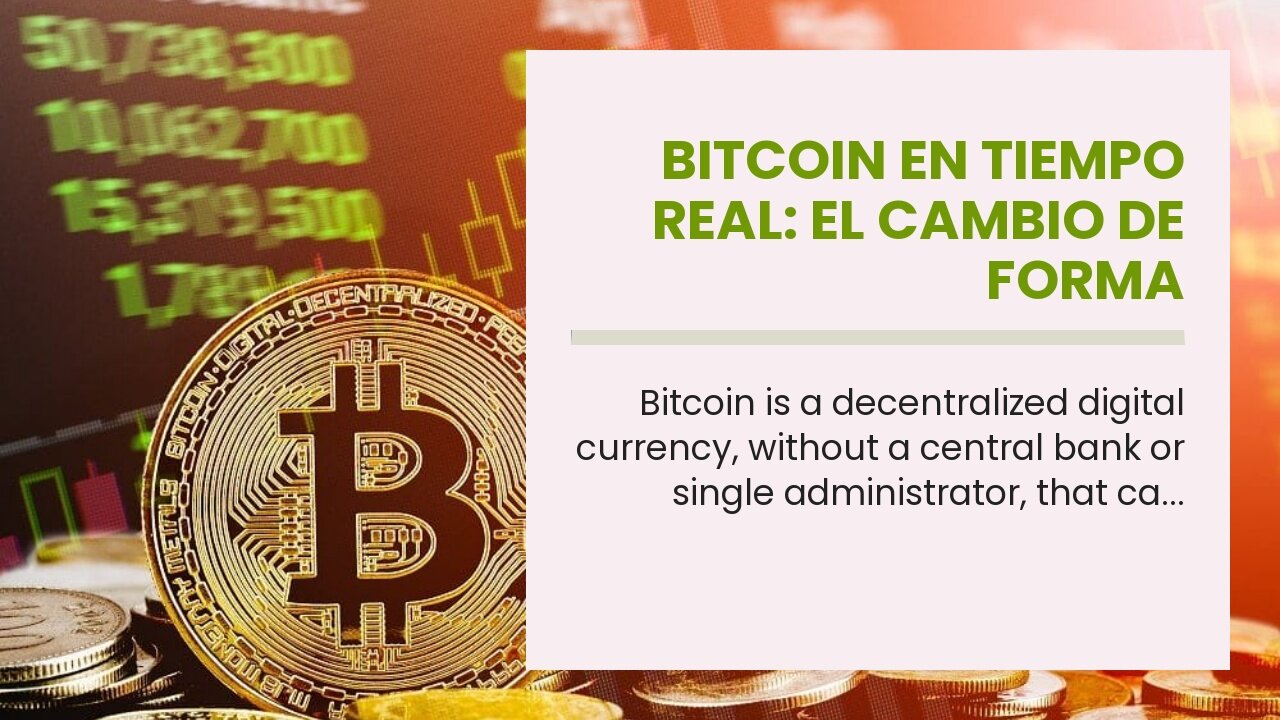Premium Only Content

Bitcoin En Tiempo Real: El Cambio De Forma
Bitcoin En Tiempo Real: El Cambio De Forma
Bitcoin is a decentralized digital currency, without a central bank or single administrator, that can be sent from user to user on the peer-to-peer bitcoin network without the need for intermediaries. Transactions are verified by network nodes through cryptography and recorded in a public distributed ledger called a blockchain. Bitcoins are created as a reward for a process known as mining. They can be exchanged for other currencies, products, and services. As of February 2015, over 100,000 merchants and vendors accepted bitcoin as payment.
Bitcoin: A Real-Time Currency.
Bitcoin’s History.
Bitcoin was created in 2009 by an anonymous person or...
https://finetimer.site/bitcoin-en-tiempo-real-el-cambio-de-forma/
Bitcoin is a decentralized digital currency, without a central bank or single administrator, that can be sent from user to user on the peer-to-peer bitcoin network without the need for intermediaries. Transactions are verified by network nodes through cryptography and recorded in a public distributed ledger called a blockchain. Bitcoins are created as a reward for a process known as mining. They can be exchanged for other currencies, products, and services. As of February 2015, over 100,000 merchants and vendors accepted bitcoin as payment.
Bitcoin: A Real-Time Currency.
Bitcoin’s History.
Bitcoin was created in 2009 by an anonymous person or group of people under the name Satoshi Nakamoto. It was designed as a peer-to-peer electronic cash system that would allow online payments to be sent directly from one party to another without the need for a third party, such as a bank or credit card company. Bitcoin is the first decentralized cryptocurrency, as it is not subject to any government or financial institution.
How Bitcoin Works.
Bitcoin works using blockchain technology, which is a digital ledger that records all bitcoin transactions. Bitcoin users each have a unique “wallet” that stores their bitcoins. When someone wants to send bitcoins to another person, they broadcast a message to the network containing the transaction details and their digital signature. Other users then verify the transaction, and if it is valid, add it to the blockchain. Once a transaction is added to the blockchain, it cannot be altered or reversed, making it a secure way to store and transfer funds.
Bitcoin’s Recent Price Surge.
Bitcoin’s price has surged in recent months, reaching over $17,000 in December 2017 from around $1,000 at the beginning of the year. This increase in value has led to increased interest in investing in bitcoin and other cryptocurrencies. However, some experts have warned that this price surge is not sustainable and that prices could drop sharply in 2018.
Bitcoin’s Future.
Bitcoin’s Potential.
Bitcoin has the potential to revolutionize how we interact with the digital world. For example, Bitcoin could enable micro-transactions that are not possible with fiat currencies. This could have a huge impact on online content creators, who could receive very small payments for each view or interaction. Bitcoin could also help reduce fraudulent activities, since it is very difficult to counterfeit a digital currency.
Another potential use case for Bitcoin is as a way to store value. Unlike fiat currencies, which can be subject to inflationary pressures, Bitcoin is a deflationary currency, meaning that its supply is limited and its value can potentially increase over time. This makes Bitcoin an attractive investment option for those looking to protect their wealth from inflation.
Of course, Bitcoin also has risks. One of the biggest risks is that it remains highly volatile, making it difficult to use as a day-to-day currency. The price of Bitcoin can swing wildly up and down, and this volatility may dissuade some people from using it. Another risk is that the network could be hacked or otherwise compromised. While the blockchain technology that powers Bitcoin is incredibly secure, there have been instances where exchanges or wallets have been hacked and funds stolen. Finally, there is always the risk that governments will crack down on Bitcoin usage if it begins to threaten their existing fiat currency system.
Bitcoin’s Risks.
While there are many potential uses for Bitcoin, there are also several risks associated with this digital currency. One of the biggest risks is that it remains highly volatile, making it difficult to use as a day-to-day currency (Forbes, 2017). The p...
-
 6:44
6:44
FineTimer
2 years agoHow to Choose the Right Router Protocol for Your Network
531 -
 LIVE
LIVE
Major League Fishing
3 days agoLIVE Tackle Warehouse Invitationals, Stop 5, Day 2
221 watching -
 8:42:04
8:42:04
SquallRush
9 hours agoExperimenting with Non Meta Decks in Ranked
30.8K3 -
 2:01:12
2:01:12
Game On!
15 hours ago $3.40 earnedOur MLB Expert Predicts Braves to WIN the World Series!
29.9K -
 LIVE
LIVE
xBuRnTx
2 hours ago🎮 Early Bird Gets the Dub! | Fortnite Solos
83 watching -
 2:32:45
2:32:45
RG_GerkClan
3 hours ago🔴LIVE - I'm Back from Vacation...Lets Dominate - Gray Zone Warfare - Gerk Clan
11.3K1 -
 48:28
48:28
SB Mowing
8 days agoI Took a RISK Cleaning This Yard and Could’ve Ended Up in the Hospital
28.6K37 -
 LIVE
LIVE
Shield_PR_Gaming
3 hours agoGrazy Zone Warfare Solo Missions are a pain in the butt Part 2!
77 watching -
 8:04
8:04
WhaddoYouMeme
19 hours ago $5.14 earnedThe REAL Truth Behind Bieber's 'Mental Breakdown' Post
104K17 -
 LIVE
LIVE
MrR4ger
5 hours agoMIDNIGHT R4GE - TEAMWORK MAKES THE DREAM WORK / SOCT, PEAK, GEARS, ETC?
135 watching